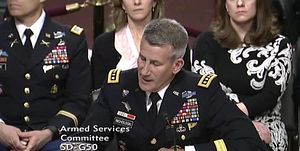Assorted defense and security links to top off the week:
America’s longest and forgotten war returns. General John Nicholson, the commander of U.S. forces in Afghanistan, described the current U.S. predicament there as a “stalemate” during an eagerly anticipated hearing before the Senate Armed Services Committee on Thursday. The Obama administration has left the Trump administration with a decelerated drawdown schedule, with 8,400 troops remaining in the country (in addition to a similar number of U.S. contractors) as the Taliban makes territorial gains and the Islamic State remains steady.
Sean Spicer, White House press secretary, hinted on Thursday that Trump would defer to Nicholson’s judgement on Afghanistan. The general suggested he’d like a troop increase to support the U.S. mission there. Any troop increase at this point would be a marked departure in the U.S. approach since the end of combat operations in Afghanistan in December 2014. (Bonus: The U.S. Army put out a great blow-by-blow read on the battle of Boz Qandahari in Kunduz province last autumn. Read that here.)
Think tanked. I’ve been reading some good think tank-produced reports that are both prescriptive for and descriptive of the Trump administration.
In no particular order, I recommend reading this Asia Society report on U.S.-China relations under Trump (PDF), this Carnegie Endowment analysis by Michael Swaine on Asian security threats in the Trump era, this prescriptive report on North Korea policy for Trump by Joel Wit (PDF), and finally this Hudson Institute report on revisiting the dysfunctional U.S.-Pakistan relationship. The latter goes nicely with a new paper out by C. Christine Fair (PDF) out with the National Bureau of Asian Research on the Pakistani Army’s strategic culture, which is free and ungated through February 10.
Ashley Townsend, meanwhile, has a helpful analysis out (PDF) of the key figures in the Trump administration who’ll come to bear on Asia policy too that I recommend. (Bonus: For a non-Trump-specific read, check out this Chatham House report (PDF), featuring the Diplomat‘s own Kerry Brown and others, on Chinese politics through 2021 — a good read before the 19th Party Congress later this year.)
A new start, indeed. Reuters reported on Thursday that Trump somewhat spectacularly pooh-poohed the Obama-era New START treaty with Russia, which commits both the United States and Russia to reduce their strategic arms stockpiles by 2018 and gives each side verification access, among other things. Trump has shown an interest in revising U.S. nuclear strategy more broadly so this could be a sign of things to come with Russia. In December, he tweeted that the U.S. “must greatly strengthen and expand its nuclear capability until such time as the world comes to its senses regarding nukes,” signalling a break with post-Cold War U.S. thinking about nuclear weapons. Over at Defense News, Aaron Mehta has a good look at the stakes involved in any nuclear posture review under the Trump administration.
Huntington’s Sino-American War prediction. Paul Musgrave takes a deservedly critical look at some of the ideas and predictions in Samuel Huntington’s Clash of Civilizations over at Cato Unbound. Among the scenarios Huntington wrote of in one of his more enduring works, Musgrave highlights that “Huntington argues that a Sino-American war (in the far-flung year of 2010!) could break out from a U.S. intervention to defend Vietnam from Chinese aggression.” This one’s a bonus read here really, but with Steve Bannon’s seemingly strong influence on the direction of U.S. policy in the Trump administration, it seemed fitting. Bannon, like Huntington, buys into the idea of a looming civilizational war coming, with the “Judeo-Christian West” on one side, and everyone else on the other. Bannon sees what Huntington described as “Islamic civilization” as the top threat to so-called Western civilization.
Special operators in the Himalayas. In the Naval War College Review, Iskander Rehman has a fascinating and well-researched look at the challenges facing India in the Himalayan theater. Rehman does a stellar job of drawing attention to the unique challenges of high-altitude combat, logistics, and even physical acclimation issues for soldiers asked to fight in this harsh terrain.

































